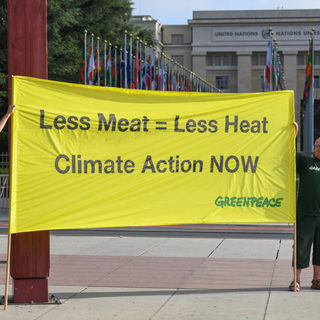August 13, 20193 min read, 655 words
Published: August 13, 2019 | 3 min read, 655 words
A report from the Intergovernmental Panel on Climate Change, a body of the United Nations, further confirms how meat consumption and production is fueling climate disruption.“Meat—sometimes specified as ruminant meat (mainly beef)—was consistently identified as the single food wi...
CRITIC REVIEWS
There don't seem to be any reviews yet.
PUBLIC REVIEWS
Well Sourced
August 14, 2019
This a very balanced and well-sourced article highlighting recent reports that confirm what many already know, that meat farming is one of the leading causes of carbon dioxide emissions and therefor a serious threat to our planet's climate. The piece does well at the end to clarify estimated population booms in coming years and how important food production will be for such a large global population.
August 14, 2019
Credible
August 21, 2019
The good -- the article covers the IPCC report well & clearly.
The bad -- the ending paragraph misrepresents the report's findings, offering this false summary: "Yet, what the report makes clear is that adopting a diet that eliminates meat or consists of a small amount of meat will help mitigate the impact of greenhouse gas emissions."
This is literally factually inaccurate. The report says that ruminant meat (mostly cows) contributes disproportionately to greenhouse gases and has significant environmental impact. Discussion of an individual's diet is only mentioned in extrapolating a UK diet to the entire world, which would require more resources than the world can offer.
A better ending might be "if each of us would have a meatless or low amount of meat" diet, or "if we can somehow globally regulate the volume of meat farmed or available", or "the West eats too much meat", etc.
Unfortunately, individual food decisions are not relevant at this point, unless the individuals choosing low-meat or veg diet hit a critical mass & impacted global beef demand.
Last point -- I get the sense that cows may cause some greenhouse gasses and some land misuse, but I also feel like having a radical reduction in cows and other livestock could cause some other unforeseen calamity. I'm not arguing for factory farming of animals, which is generally cruel and horrible, but more for animals having a free range life and minimal human oversight. There was a time when herds of animals roamed freely -- why can't we revise our HUMAN ENVIRONMENTAL TAMPERING to become animal (& nature) friendly?
August 21, 2019
Well Sourced
August 14, 2019
This user only left a rating
August 14, 2019
Political Agenda
August 16, 2019
The IPCC has been making wrong predictions for decades.
August 16, 2019
